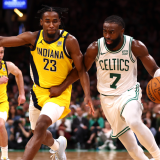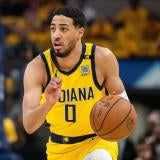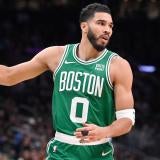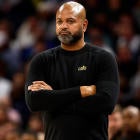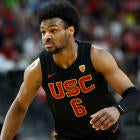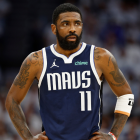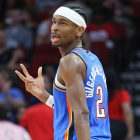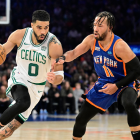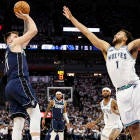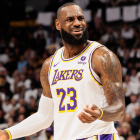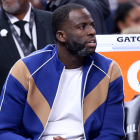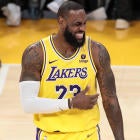With the first quarter wrapping up, it's still too early to say who is in the MVP conversation for this season. There's a huge recency bias that comes with the Most Valuable Player award. If you have a strong February and March, that can supersede a superior season overall. Still, you have to start somewhere, and because I like getting ahead of myself perpetually, here's a look at the MVP candidates so far this season.
THE CONTENDERS
Marc Gasol, C, Memphis Grizzlies: The Big Spain, Wendigo, whatever nickname you want to use for him, the Most Valuable Gasol has been the biggest individual reason you can point to for the Grizzlies having leaped out to such a great start in the brutal Western Conference (though their overall schedule is only 13th in the league in terms of strength via Basketball-Reference.com). For years, one of the vexing questions has been why Gasol wouldn't be more aggressive given his wide range of offensive skills. The reason has been that Gasol has never been the kind of player to force the action. He takes what the defense gives, plays to the team's strengths, and isn't concerned with his touches, numbers or attention.
But with Zach Randolph undergoing a slight but overstated slide and with the team finally able to run some of Dave Joerger's more advanced offensive sets, Gasol has flourished. He remains a gifted and effective passer (and those two things are not the same), but he's been much more insistent with his attack in the post. He's added a skyhook and his fadeaway jumpshot has never looked better. Gasol has picked up quite a few counter-moves from Z-Bo over the years and has such good understanding of where his mid-range jumper lies that at times you wonder if he's just marked the floor.
Gasol is also one of the best in the league at quick moves. He's extremely opportunistic, but whereas in years past he would look for ways to exploit the defense to find a teammate open (where sometimes that would be by the defense's design), now he's recognizing his looks are high-percentage looks.
Gasol's defense hasn't been as good as what it was when he won defensive player of the year, but that can in part be attributed to the energy the offensive end has required from him. He's still a plus-plus defender, and that combined with everything else he does and the team's success nets him at the top of this list, improbably.
Stephen Curry, PG, Golden State Warriors: The Warriors have the best record in the league after Thursday's win over New Orleans, and have looked like arguably the best overall team with their combination of offense (fifth-best in the league in points per possession) and defense (first in points per possession allowed). And Curry has, of course, been a huge part of that.
Consider this. Curry's a guard, right? Takes a lot of jumpers, big 3-point shooter? He's shooting 44 percent on pull-up 3-pointers, taking 4.4 of them per game. There's really no one like him in terms of a pull-up perimeter shooter, especially in transition. And the Warriors are smart enough to know this and constantly look to free him up in those situations. This goes back to when Mark Jackson coached the team, but Steve Kerr has done as good a job at getting him these kinds of looks:
Curry almost defies basketball convention with his ability to hit those shots (though right now Chris Paul is doing the same). Pull-up shots are supposed to be low-percentage, yet with Curry they're actually better than his catch-and-shoot numbers (37.9 percent on just 3.7 per game). Oh, and hey, he’s averaging 7.8 assists per game and has become a much better defender.
There are very few players who I would define as being able to "take over a game." Curry can do it for the entire span of 48 minutes, and the results are showing for Golden State.
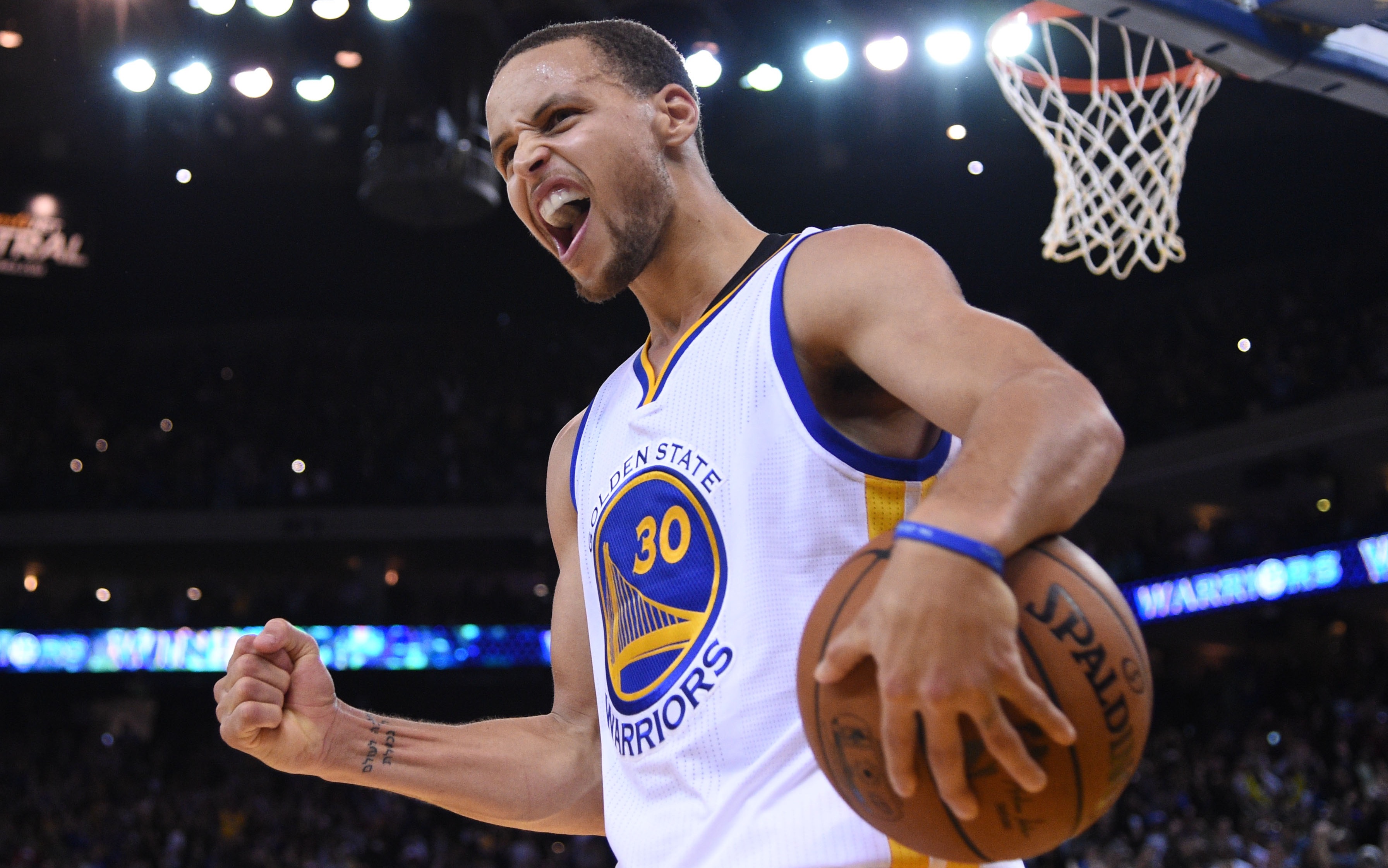
Anthony Davis, PF, New Orleans Pelicans: The Unibrow is more phenomenon, urban legend than superstar at this point. The stats are just stats, but I mean… LOOK AT THESE STATS:
25.2 points per game, 11.5 rebounds per game, 1.9 assists, 2.3 steals, 3.1 blocks, shooting 57 percent from the field, 76 percent from the line, with a 33.7 PER, and the Pelicans are 27 points better than their opponent per 100 possessions with him on the floor. He's second in points per game, sixth in rebounds, second in steals, first in blocks, first in PER by a significant margin and has steadily improved in all phases of the game defensively.
Very few players change possessions the way Davis does, as opponents, even guards, are scared to drive on him, but he can also hedge on the pick and roll to the perimeter and has amazingly agile hands considering they're attached to tent poles.
And offensively, there's just so much that he can do.
The Pelicans have to make the playoffs in order for Davis to remain in contention for this, but if they can somehow get it together and he keeps up this kind of production, it's going to be difficult to walk away with any perception other than he's the most impactful player at both ends of the floor.
Chris Paul, PG, Los Angeles Clippers: The Clippers started slowly and an avalanche of "Has Chris Paul passed his peak?" questions started to arise.
Nope.
Paul is averaging 9.5 assists, with the second-highest assist percentage in the league at 45.4 percent of all Clippers makes coming off his dimes. He's lethally efficient this season, shooting 53 percent (!) from the field and 43 percent from behind the arc, to go along with 87 percent from the line. There's a chance, albeit a slim one, that Paul could wind up leading the league in assists while shooting 50-40-90, which only Steve Nash has done.
Meanwhile, the Clippers have won six straight and eight of their last 10. The strength of schedule is nothing to write home about, but their play has been, and Paul has been at the front of that. He's also the best leader of any player among the contenders, has the longest tenure of any contender and has the storyline (overlooked point guard finally gets recognition for being the best at his possession over a seven-year span).
But this likely won't hold. Paul tends to drift for much of the season from January until March. He wisely saves himself for the playoffs. But if he can keep going like that, with the way he's defending, driving, scoring, passing and leading, he's going to be a tough guy to ignore for the vote.
IN THE CONVERSATION
James Harden, SG, Houston Rockets: I have some bad news for everyone who's enjoying the jokes that were funny a year ago. James Harden hasn't been a bad defender this season. That's not to say he's been a good one. No one's out here suggesting he's Paul George (miss you, PG13). But the Rockets are 0.5 points per 100 possessions better with Harden on the floor instead of off.
That's a number that can be influenced heavily by a lot of factors, but Harden has given legitimate effort this season. There are still times when he's caught napping, but at least there is some awareness there, and he's not getting crushed possession by possession.
And offensively, there hs to be some consideration for his ability to draw fouls. The field goal percentage is woeful (41 percent) and his style of play is aggravating to watch. Harden draws 9.6 free throws per game, an absurd number. Watching the Rockets is excruciating on that end, with an endless parade of whistles. But at some point you have to acknowledge how effective it is. Combine that with 6.6 assists per game and a second-ranking in VORP (Value Over Replacement Player via Basketball-Reference) and you have a player who has done so much to keep the Rockets among the elites with Dwight Howard out, I don't know how you could deny his impact.
DeMarcus Cousins, PF/C, Sacramento Kings: Basketball is a game of possessions, and 100 is a rough average of how many possessions there are, game by game. That's why that "per 100 possessions" metric is used so often (even if the pace varies wildly from decade to decade). And out of every 100 possessions, DeMarcus Cousins scores 37.9 points (best among players playing over 30 minutes per game), 20.4 rebounds (second among such players, behind Andre Drummond by a half-board), blocks 3.2 shots and only turns the ball over 3.3 times in that span, while shooting 46 percent from the field.
Cousins has been a monster in the 15 games he's played in this season before an illness took him down for an extended stretch. He has become the league's pre-eminent bully. If Anthony Davis tears through your home like a tornado, and Marc Gasol calmly dissects you with precision, Cousins straight up drags you into the alleyway, beats you up and takes your lunch money.
The Kings would not be where they are, hanging on in the West, were it not for Cousins. (As evidenced by their drop since Cousins went down.)
The Kings would have to make the playoffs for Cousins to garner any consideration, but he needs to be on the list. That "most valuable" aspect is key here. The Warriors without Curry are still stacked. The Pelicans without Davis are a bad mishmash, but they're kind of that with him around. The Grizzlies still grit and grind without Gasol. But without Cousins, the Kings are a shell. That should matter.
Kyle Lowry, PG, Toronto Raptors: Lowry's numbers don't jump off the page at you. Twenty-one points per game (really good, not great) on 15 shots per game, shooting 45 percent from the field (again, really good, not great) and just 33 percent on 3-pointers. He's averaging 6.8 assists per game. He's ninth in assists per game, just 13th in assist percentage (percentage of field goals Lowry assisted on).
Lowry definitely falls into the 2011 Derrick Rose mold of, "The eye test and the numbers don't match up." Because he looks incredible. His ability to find the shot he wants is up there with the elites, and while the phrase "bulldog" is pitched around to me (including by me), it's the best word I can come up with. He gets right up into defenders and has such great body and ball control, he can take a licking and keep on ticking the scoreboard up.
The Raptors wouldn't be anywhere without Lowry, who has played like arguably the best point guard in the Eastern Conference.
John Wall, PG, Washington Wizards: Wall is the other guy on that list. Eighteen points per game and he's third in assists (9.6 per game) and assist percentage at 44.9, behind only Rajon Rondo and Chris Paul. Wall's shooting numbers hurt him here (42 percent from the field, just 32 percent from 3). But his impact gets lost in the various numbers.
Wall is one of the few players, not just point guards, but players in the league who can lock a guy up on defense, force the steal, get out in transition and finish or find a teammate for an open or easy bucket. His drive-and-kick game has flourished this season, and if you want to talk about the best point guards at both ends, in all phases of the game, Wall has to be on the list.
THE WINE AND GOLD ELEPHANT IN THE ROOM
No Cavaliers on this list, and that feels wrong. But there are reasons none of the Big 3 have cracked it.
LeBron James, SF, Cleveland Cavaliers: Dude has drifted and been outright bad for stretches. Both Jabari Parker and Giannis Antetokounmpo breezed by James for dunks in the Cavs’ win over the Bucks, and that wasn't a matter of not wanting to foul or an outlier. James has been outright bad defensively this season, constantly frustrated by his teammates while also simply not getting up into ball handlers or watching his man on the weak side.
The numbers are still there, because it's LeBron James: 24.6 points, 5.7 rebounds, 7.6 assists, shooting 47 percent from the field and 34 percent from 3-point range. But the eye test matters here, and the eye test says James hasn't just been "eh," he's been "ugh" for long stretches. The Cavaliers' slow start is on him as much as it is on anyone. That said, if he gets back in shape, expect him to be right here by the halfway mark.
Kyrie Irving, PG, Cleveland Cavaliers: Irving scoring 22 points on 49 percent from the field and 43 percent from 3-point land is bonkers, and he's averaging 4.7 assists on a team with LeBron James to boot. He's been asked to score, and that's what he's doing. He's been one of them most lethally efficient guards in the league this year.
So … yeah. Why isn't he on here?
I don't blame Irving for the assists issue; 4.7 per game is good, and he's passing a really high amount, 60.5 times per game according to NBA.com. But he's dreadfully low on the assist opportunities per game metric: 35th in the league by that standard, behind Lance Stephenson, Derrick Rose and Kobe Bryant. And much of the early season kerfuffles came in relation to Irving gunning.
That said, I'd be fine with it if he wasn't so horrid defensively. There really may be no worse player in the league at stopping the ball in transition than Irving. He's constantly settling back, never attacking to get the guard to have to reset. He just waits patiently for the attacker to either pull up in his face or breeze around him. Irving has only so much energy, but you have to be better than that to get MVP consideration. That said, Irving has been fantastic overall and deserves a mention if he keeps this up and improves in his passing just a little bit.
HONORABLE MENTION: Jimmmy Butler, Klay Thompson, Joakim Noah, Pau Gasol, LaMarcus Aldridge








